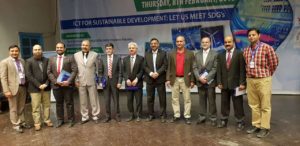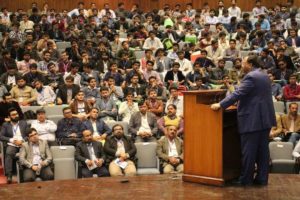Pakistan lacks specialized skilled resource for CPEC: Gen. Muhammad Asghar
A consultant of the Higher Education Commission (HEC) on China Pakistan Economic Corridor (CPEC) Lt. Gen. (R) Muhammad Asghar has said lack of human resource is the biggest issue of the country especially in Balochistan, where the successive provincial governments have failed to invest in education and skill development sectors over the many years. In such a situation, he believes Balochistan will be running out of its people when CPEC related activities will be generated in the province.
Gen. Muhammad Asghar who was the guest of honor at the IEEEP All Pakistan Students Seminar in Mehran University of Engineering and Technology (MUET) Jamshoro said, while talking to Engineering Review that Balochistan required a shift in its attitude otherwise no change would take place in the province.
He put forth an example from the US which according to him developed after inviting people from all over the world. Balochistan needs skilled people and unfortunately it does not have at home because of the lack of education. The manpower in Balochistan is not sufficient thus CPEC initiatives will require more people who should be invited from other provinces, he says. Besides Baloch, Balochistan houses Pakhtoon population also which will be employed will
yed but still Balochi
stan will be running out of men to respond to the demand of CPEC.
“Punjab’s population is reluctant to go to Balochistan due to security issues”, he said. “Also there was already a lot of potential for them in Punjab”.The lack of skilled human resource in Pakistan has forced Chinese to bring their men for the works Pakistanis are not prepared for? It seems so if one listens to Gen. Asghar. “Chinese would come for the sectors we are not skilled for”, he said claiming “But still over 60 thousand Pakistanis are working on CPEC projects in the country.”
Gen. Asghar who gave a detailed briefing on CPEC’s potential for future engineers to a houseful auditorium of the university was keen to respond to the concerns as regards Balochistan. “Balochistan is on the verge of a huge generation of activities under CPEC and now it’s up to the people of the province how they reap its benefits. Balochistan has a larger part of Pakistan’s coastline where 5 to 6 ports would be developed and all benefits are sure to go to Balochistan,” he says. “The subsequent revenue will go to Balochistan; not to Punjab. Now it is up to the people of Punjab especially youth how they get benefits.”Gen. Asghar said the HEC was making all out efforts to produce human resource—the job Pakistan should have begun with from 2007, a decade back from today. We are lagging behind and now trying to bridge the gap. Dwelling over the lacking, he revealed there were many fields in which Pakistan did not have expertise. For instance, we are going for US$8.2 billion railway project but we don’t have experts in railway engineering. While launching master course in UIT we came to know about just one PhD. in the field. Pakistan will have a series of ports right from Gwadar to Keti Bundar in Sindh but the education link is missing since we don’t have ports management and handling engineers. We now have Orange Line in Punjab but don’t have mass transit management experts.
Gen. Muhammad Asghar was sure there was huge scope for engineers in CPEC. For such a purpose, Pakistan’s universities are being linked with Chinese universities. He announced MUET would soon be the part of consortiums of engineering universities. He told the audience that over 20 thousand Pakistanis are enrolled in Chinese universities in various education programs.


